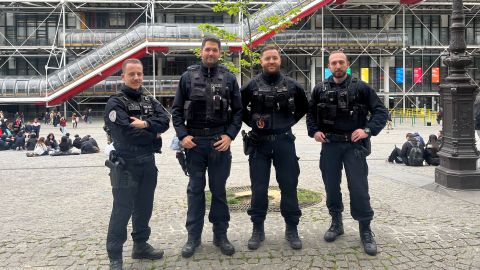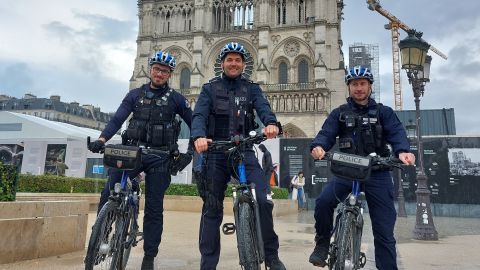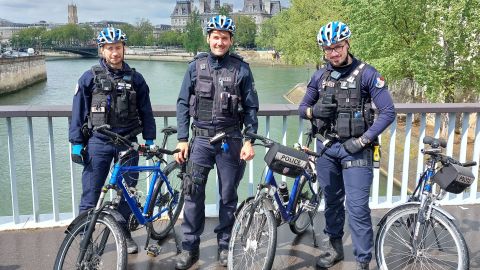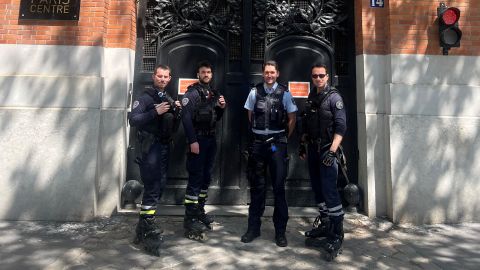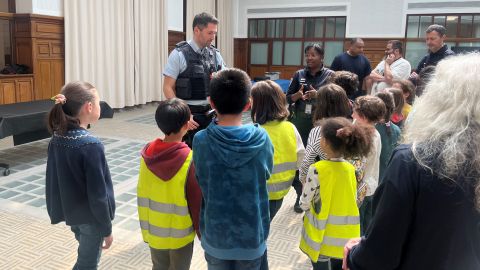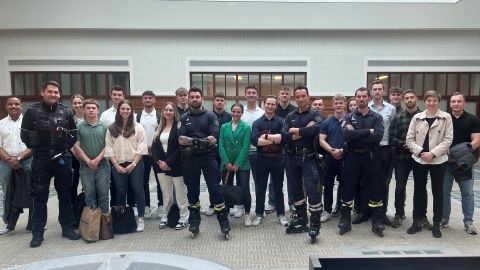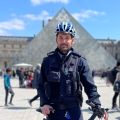After taking part in the "European Commissariats" for the first time last year, I quickly decided that I would like to expand on this experience. In June 2022, I supported colleagues from the French Gendarmerie Nationale as part of a multi-day youth bike race in Bitche, not far from the French-Saarland border. This year, I wanted to deepen the consistently positive impressions I had gained and take part in a program lasting several weeks. So I submitted another application to Department 425 of the Ministry of the Interior of North Rhine-Westphalia for the 2023 spring season. After a few weeks, I was informed that I would be able to support the Paris police prefecture (Préfecture de Police de Paris, DSPAP) for three weeks at the start of the tourist season in April/May, in one of the most impressive metropolises in Europe and the world. The anticipation grew daily.
The Paris Police Prefecture is a department of the French Police Nationale, which, unlike the Gendarmerie Nationale, is responsible for the urban regions.
Preparation and arrival
The journey was planned in consultation with the French contact officers and our own ZA department. I took the train to Gare du Nord in Paris, where I was met by an employee of the Paris Prefecture of Police. I was accommodated in the Hotel Cercle national des Armées, an upscale hotel for guests of the French military in the 8th arrondissement (city district).
Welcome and area of operation
The next morning, my two Portuguese colleagues and I were welcomed at a breakfast buffet in the 13th arrondissement by an official from the International Relations Department of the Paris Prefecture of Police. There, in a relaxed atmosphere, I received a briefing on the French law on the use of firearms. The tasks assigned to us as foreign police officers on the basis of the Prüm Convention were also explained in detail.
This welcome was also attended by tutors from the police stations of the city districts to which we were subsequently assigned. Much to my delight, I was assigned to the largest police station in Paris with around 500 employees, the "Commissariat Paris Centre". The watch area covers the 1st - 4th arrondissements and therefore the immediate center of Paris. These districts were merged a few years ago. They are home to sights such as the Musée du Louvre, Cathédrale Notre-Dame, Place de la Concorde, Hôtel de Ville (City Hall) and Jardin des Tuileries (Tuileries Garden). Accordingly, there is a very high volume of tourists in these districts, including from Germany, of course.
After the welcome, I went with my tutor to my office for the next three weeks. There I was introduced to the heads of the various organizational units and received a warm welcome from them.
During the first week, I worked in the "Brigade Territoriale de Contact LTN" (local contact brigade in the Louvre, Tuileries, Notre-Dame area). This organizational unit is affiliated to the V.T.T. (Vélo Tout Terrain = loosely translated as mountain bike). As a result, I spent the whole week on patrol with at least three colleagues on my bike. This may sound a little unusual at first, but in view of the extreme traffic and the very narrow streets and alleyways, it is an absolutely adequate alternative. Experience has shown that in certain areas, you can even reach your place of work faster by bike, as various locations are very difficult to reach by patrol car due to the high volume of tourists.
As a contact brigade, we worked closely with the security service and supported them when necessary. However, we also spent a lot of time maintaining a presence at busy locations and carrying out identity and traffic checks. As we actually spent most of our time on the street, we were always visible and approachable for citizens.
We also worked closely with the "Rollers" (inline skaters) group, which is unique in France and is also affiliated to the V.T.T.. The colleagues are specially trained to use the inline skates and spend the entire time on duty in the "rollable shoes".
In the second week, I transferred to the HBM contact brigade (Halles, Beaubourg, Montorgueil). The "Forum des Halles" is a large shopping center, which is roughly comparable in size to the Centro Oberhausen. Around this center there is a large pedestrian zone with many bars and restaurants, which attracts mainly young people and tourists. An adjacent park also serves as a transshipment point for narcotics and was therefore patrolled with high frequency. The core tasks did not differ fundamentally from the previous week, but due to the large crowds and the location (pedestrian zone), they were almost exclusively carried out on foot. We also regularly assisted the security service with incidents such as assault, robbery or theft.
When searching for criminals, we were actively supported by the approximately 1,000 video cameras installed throughout the city of Paris. These are the property of the Paris police and can be monitored in real time (a special feature in France, due to the special administration in Paris). As a result, we were able to obtain very prompt information on the description of people, direction of escape or even the specific location of people or vehicles.
I spent the last week of my assignment back with the LTN contact brigade, so I was out and about on my bike again. During this week, I was lucky enough to meet a course from the HSPV Duisburg, which was visiting the police station in the center of Paris as part of a study trip. As well as giving them a little taste of home, I was able to explain and explain many of the conditions and work processes and help with the translation.
One day later, I took part in a guided tour of the station for a primary school class in Paris. The children, aged around 7-8, were given lots of small presentations and illustrations in an attempt to explain police work. They were also allowed to ask me questions, and the children and I had a lot of fun.
One of the highlights during this period were the demonstrations and marches on May Day, which started about 200 meters from the station on the Place de la République. These were accompanied by brigades comparable to our task force. Although we hardly had any contact with them in our work, they were very impressive due to their size.
I was deeply moved and impressed by two unfortunately very sad occasions during my assignment. On two occasions, all available employees of the department came together for a minute's silence to commemorate colleagues from the Gendarmerie Nationale and the Police Nationale who had recently died in the line of duty. These were moderated and conducted by the head of service. The consternation, of course, but above all the extreme cohesion of the individual police organizations was clear.
My conclusion
During my entire stay, I was able to observe different perceptions of the citizen of my role as a foreign police officer. Due to the rather uniform dark blue color of the French and German uniform parts, I was not perceived by many citizens as a non-French officer. However, when I was approached, the citizens were very interested and sometimes surprised. Overall, the feedback was positive.
In addition to the work experience, where I was able to identify some differences and adapt aspects for my own work, I also developed my language skills. The many, very friendly and enormously helpful French colleagues played a large part in this. In this respect, this assignment was probably also an added value for the Paris Prefecture of Police, as I was able to act as a translator several times and thus overcome the language barrier between police and citizens.
I am very proud to have represented the NRW police and also the Federal Republic of Germany in France and to have played a part in maintaining and continuing European cooperation.
I will have positive memories of these three weeks for a long time to come. My interest in further assignments abroad was strengthened even further as a result.
